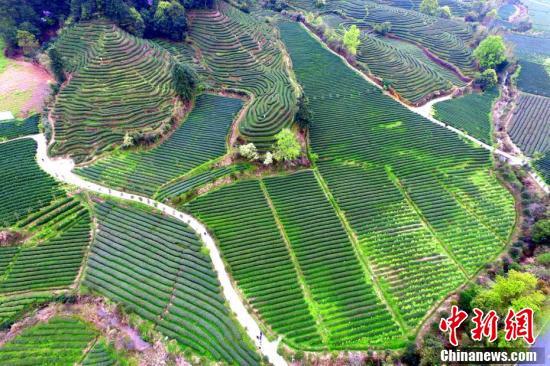In the early spring, Yanzike ecological tea garden, located in the ravines of the lush Wuyi Mountain National Park in southeast China’s Fujian Province, is colored by a sea of golden rapeseed flowers, which blossom among lines of tea bushes, turning the area into a popular tourist hotspot.

Aerial photo shows the Yanzike ecological tea garden. (Photo/Chinanews.com)
The tea garden is part of an organic tea project being guided by Liao Hong, an agronomist at the Fujian Agriculture and Forestry University and a sci-tech expert sent to the locality by the provincial government to help spearhead innovation in rural areas.
Yang Wenchun, owner of the tea garden, felt frustrated several years ago because of problems such as damage to soil health and a decline in tea quality, which had emerged due to the increasing density of the tea plants. Liao convinced Yang to plant rapeseeds and soybeans together with the tea bushes, leaving the resulting crops to decompose and mix back into the soil on the tea farm. The additional crops provided sources of organic fertilizer that could help build up reserves of phosphate, potash, and nitrogen in the soil.
The polyculture cultivation method not only solves the problem of soil degradation caused by excessive use of chemical fertilizers, but also protects biodiversity and the ecosystem in the tea garden, combining to provide both economic and ecological benefits.
Consequently, the tea garden has cut the use of chemical fertilizers and pesticides by more than 30 percent while reducing phosphorus pollution in water bodies by over 60 percent, becoming a national pilot demonstration zone for sustainable agricultural development.
“The quality of tea leaves improved by 20 percent, and the purchasing price of the tea leaves has doubled,” said Yang, who took the lead to establish a tea cooperative. So far, the tea cooperative has promoted the use of these ecologically-friendly methods on land covering over 4,000 mu (about 266.7 hectares) of tea farms, raking in an annual profit of more than 7 million yuan (about $1.1 million).
During his visit to Yang’s tea farm on March 22, 2021, Chinese President Xi Jinping called for coordinated efforts to promote tea culture, the development of the tea industry and the use of technology in the sector. Xi also stressed the need for more efforts in implementing arrangements to dispatch technical professionals to rural areas to help with local development.
Bearing Xi’s words in mind, the provincial science and technology department has allocated more than 20 million yuan in funds directed at the use of technology in its tea industry in the past year, according to You Jiansheng, deputy director of the provincial science and technology department.
Meanwhile, a think tank consisting of 210 famous experts, including Liao, has sent experts 347 times to provide regular technical support for tea enterprises and team farmers.
Liao’s team has established a number of high-quality and efficient ecological tea garden demonstration bases in different places in Fujian, including Wuyishan city and Anxi county. Since 2015, the accumulated area of the province’s ecological tea garden demonstration bases has surpassed 10,000 mu. Liao’s team has also trained over 1,000 agricultural technicians and 2,000 farmers in Fujian.

Copyright © General Office of Fujian Provincial People's Government
Website Identification Code 3500000049Registration Number: 15003084
All rights reserved. The content (including but not limited to text, photo, multimedia information, etc) published in this site belongs to fujian.gov.cn.
Without written authorization from fujian.gov.cn, such content shall not be republished or used in any form.